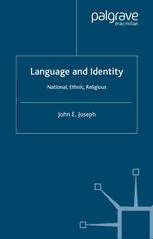Table Of ContentLanguage and Identity
National, Ethnic, Religious
John E. Joseph
Language and Identity
Previous publications by this author:
ELOQUENCE AND POWER: The Rise of Language Standards and Standard
Languages (1987)
LIMITING THE ARBITRARY: Linguistic Naturalism and its Opposites in Plato’s
Cratylus and Modern Theories of Language (2000)
LANDMARKS IN LINGUISTIC THOUGHT II: The Western Tradition in the
Twentieth Century (with Nigel Love and Talbot J. Taylor, 2001).
FROM WHITNEY TO CHOMSKY: Essays in the History of American Linguistics
(2002)
Language and Identity
National, Ethnic, Religious
John E. Joseph
© John E. Joseph 2004
Softcover reprint of the hardcover 1st edition 2004
All rights reserved. No reproduction, copy or transmission of this
publication may be made without written permission.
No paragraph of this publication may be reproduced, copied or transmitted
save with written permission or in accordance with the provisions of the
Copyright, Designs and Patents Act 1988, or under the terms of any licence
permitting limited copying issued by the Copyright Licensing Agency,
90 Tottenham Court Road, London W1T 4LP.
Any person who does any unauthorised act in relation to this publication
may be liable to criminal prosecution and civil claims for damages.
The author has asserted his right to be identified
as the author of this work in accordance with the Copyright,
Designs and Patents Act 1988.
First published 2004 by
PALGRAVE MACMILLAN
Houndmills, Basingstoke, Hampshire RG21 6XS and
175 Fifth Avenue, New York, N.Y. 10010
Companies and representatives throughout the world
PALGRAVE MACMILLAN is the global academic imprint of the palgrave
Macmillan division of St Martin’s Press, LLC and of Palgrave Macmillan Ltd.
Macmillan® is a registered trademark in the United States, United Kingdom
and other countries. Palgrave is a registered trademark in the European
Union and other countries.
ISBN 978-0-333-99753-6 ISBN 978-0-230-50342-7 (eBook)
DOI 10.1057/978-0-230-50342-7
This book is printed on paper suitable for recycling and made from fully
managed and sustained forest sources.
A catalogue record for this book is available from the British Library.
Library of Congress Cataloging-in-Publication Data
Joseph, John Earl.
Language and identity:national, ethnic, religious/John E. Joseph.
p. cm.
Includes bibliographical references and index.
ISBN 978-0–333–9975 2–2(cl oth )—I SBN978-0–333– 99753 –0(.pbk)
1. Language and languages. 2. Identity (Psychology)
3. Sociolinguistics. 4. Nationalism. I. Title.
P107.J67 2004
400—dc22
2004043621
10 9 8 7 6 5 4 3 2 1
13 12 11 10 09 08 07 06 05 04
In memory of my beloved grandparents and godparents
Tanus ibn Yusuf Abu Butrus Hubayqat / Anthony Joseph
4 Nov. 1883–20 Sept. 1963
Suraya Qamar / Sarah Amar Joseph
1 Nov. 1898–25 Apr. 1987
This page intentionally left blank
Contents
Preface x
1 Introduction 1
The identity of identity 1
What language has to do with it 2
Fundamental types of identity 3
Construction and multiplicity 6
Other terms used in current research 9
Identity as a linguistic phenomenon 11
2 Linguistic Identity and the Functions and Evolution
of Language 15
Identity and the traditional functions of language 15
Identity and the phatic and performative functions 17
Does identity constitute a distinctive function
of language? 20
‘Over-reading’: identity and the evolution of language 25
Conclusion 39
3 Approaching Identity in Traditional Linguistic Analysis 41
Introduction 41
Classical and Romantic views of language, nation,
culture and the individual 42
The nineteenth century and the beginnings of
institutional linguistics 46
The social in language: Voloshinov vs Saussure 48
Jespersen and Sapir 51
Firth, Halliday and their legacy 56
Later structuralist moves toward linguistic identity:
Brown & Gilman, Labov and others 58
From ‘women’s language’ to gender identity 61
From Network Theory to communities of practice
and language ideologies 63
vii
viii Contents
4 Integrating Perspectives from Adjacent Disciplines 67
Input from 1950s sociology: Goffman 67
Bernstein 68
Attitudes and accommodation 70
Foucault and Bourdieu on symbolic power 73
Social Identity Theory and ‘self-categorisation’ 76
Early attempts to integrate ‘social identity’
into sociolinguistics 77
Communication Theory of Identity 80
Essentialism and constructionism 83
5 Language in National Identities 92
The nature of national identities 92
When did nationalism begin? 95
Constructing national identity and language:
Dante’s De vulgari eloquentia 98
Taming and centring the language: Nebrija and Valdés 102
Language imagined as a republic: Du Bellay 106
Fichte on language and nation 109
Renan and the Kedourie–Gellner debate 111
Anderson’s ‘imagined communities’ and Billig’s
‘banal nationalism’ 115
De-essentialising the role of language: Hobsbawm
and Silverstein 119
Studies of the construction of particular
national-linguistic identities 125
Europe 126
Asia 128
Africa 130
Americas 130
Australasia and Oceania 131
6 Case Study 1: The New Quasi-Nation of Hong Kong 132
Historical background 132
The ‘myth’ of declining English 134
Samples of Hong Kong English 140
The formal distinctiveness of Hong Kong English 144
The status of Hong Kong English 148
The functions of Hong Kong English 150
Contents ix
Chinese identities 151
Constructing colonial identity 154
The present and future roles of English 158
7 Language in Ethnic/Racial and Religious/Sectarian
Identities 162
Ethnic, racial and national identities 162
From communities of practice to shared habitus 167
The particular power of ethnic/racial identity claims 168
Religious/sectarian identities 172
Personal names as texts of ethnic and religious identity 176
Language spread and identity-levelling 181
8 Case Study 2: Christian and Muslim Identities
in Lebanon 194
Introduction 194
‘What language is spoken in Lebanon?’ 195
Historical background 196
Distribution of languages by religion 197
The co-construction of religious and ethnic identity:
Maronites and Phoenicians 198
Constructing Islamic Arabic uniqueness 200
Recent shifts in Lebanese language/identity patterns 203
Still more recent developments 207
Renan and the ‘heritage of memories’ 208
Linking marginal ethnic identities: Celts and Phoenicians 212
Language, abstraction and the identity of Renan 215
Maalouf’s utopian anti-identity 220
Afterword: Identity and the Study of Language 224
Notes 228
Bibliography 235
Index 256

